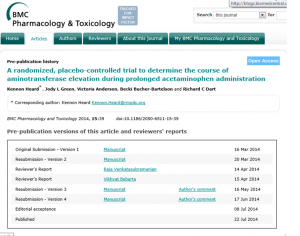 It’s two years now since the journals BMC Pharmacology and BMC Clinical Pharmacology merged to create BMC Pharmacology and Toxicology. Chris Morrey, the Executive Editor for the journal marks the occasion with a birthday post over on the BMC series blog.
It’s two years now since the journals BMC Pharmacology and BMC Clinical Pharmacology merged to create BMC Pharmacology and Toxicology. Chris Morrey, the Executive Editor for the journal marks the occasion with a birthday post over on the BMC series blog.
In merging a biology journal that has ‘traditional’ anonymous peer review (BMC Pharmacology) with a medical journal that has fully open peer review (BMC Clinical Pharmacology) what should the peer review process be? In the end, openness prevailed (in keeping with all the other medical titles in the BMC series) where the identity of the reviewers is known to all parties – editors, authors and readers.
To see what the Editorial Board – with their variety of expertise in biology and clinical disciplines – thought about peer review, we conducted a short survey with them. We’ve now published the results in an editorial in BMC Pharmacology and Toxicology, but below is a summary of our findings and conclusions. To our surprise, the majority of Editorial Board Members preferred double-blind peer review – where authors and reviewers do not know each other’s identity – over open peer review. Intriguingly, other much larger surveys have also come to similar conclusions.
However, of those Editorial Board Members that favoured open peer review, they did so because it increased accountability and transparency. Certainly, we agree with those sentiments and feel that the potential benefits outweigh the negatives.
“In my opinion when the reviewers identity is revealed they perform more diligently towards the task of reviewing,” said Shazia Jamshed, one of our Editorial Board Members.
Open peer review means we can provide a fully transparent pre-publication history, i.e. the reading public can see who reviewed the manuscript and what was said. And by making peer review completely open, and reviewers (and editors) accountable, we aim to reduce the competing interests that can occur.

The survey results show that while there may be a preference for double-blind peer review, perhaps, in this era of predatory publishers and ‘sting’ operations, open peer review ensures that the decision-making process in publishing research is fully transparent for all to see.
And so we will continue with open peer review at BMC Pharmacology and Toxicology. There are clear ethical grounds for doing so, valuable information to be gleaned for training purposes and further research to be had. We are also heartened by the feedback we receive more generally from authors on our open peer review journals who value the helpfulness, quality and detail of the reports they receive.
Comments